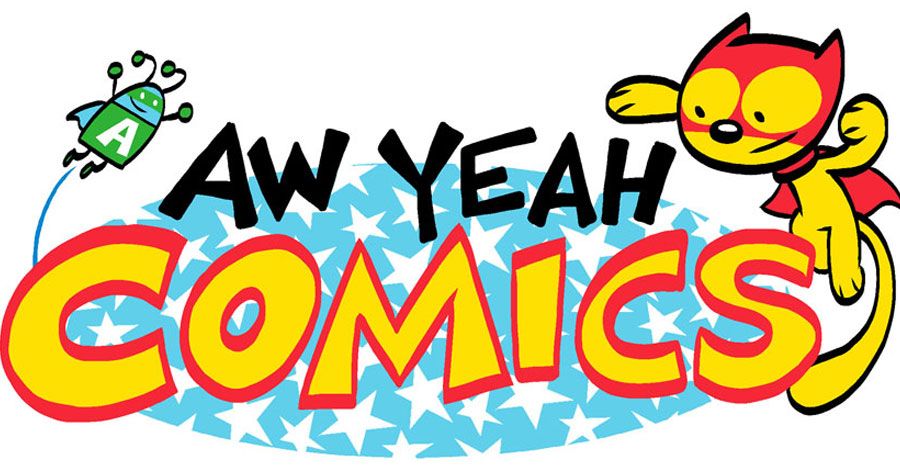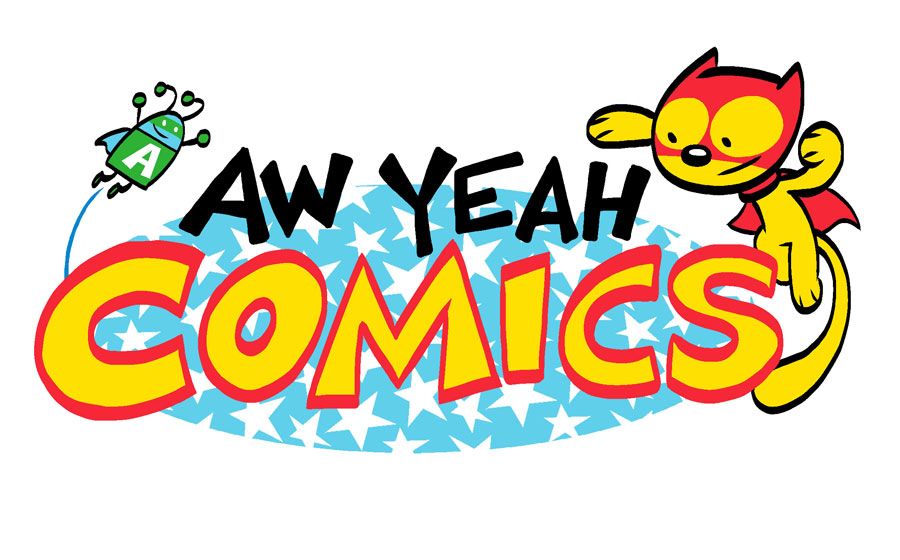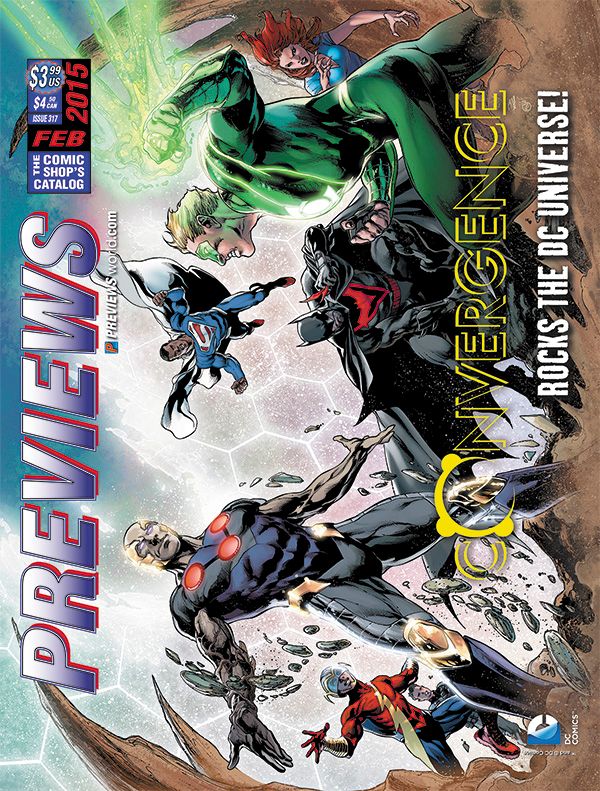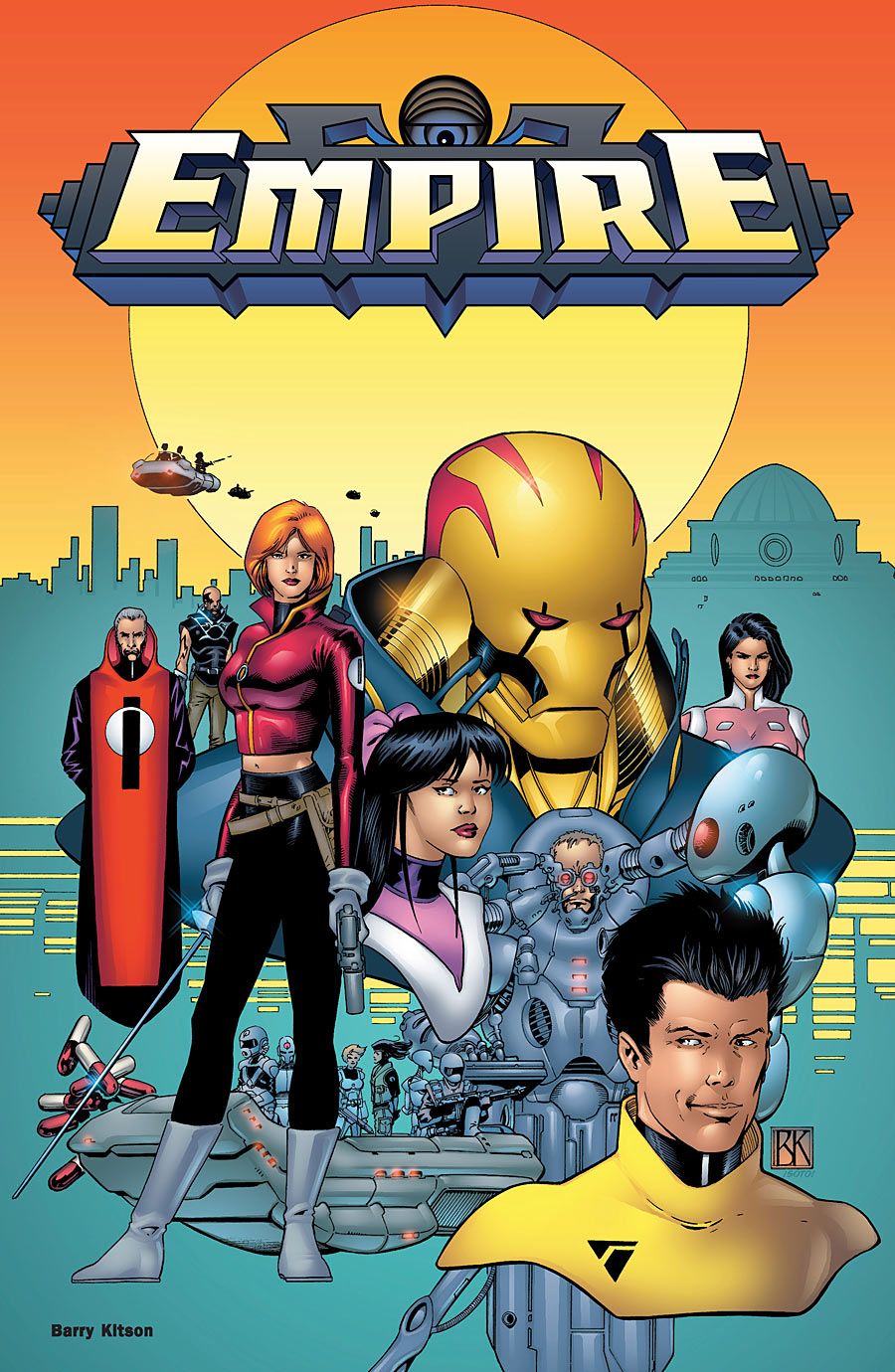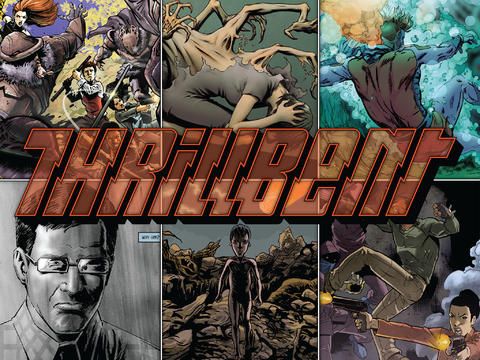A year and a half ago, writer and digital comics advocate Mark Waid became part owner of Alter Ego Comics of Muncie, Indiana. Today, he is announcing a major change for the store, and in this exclusive interview, he opens up about the lessons he's learned from his involvement in both the direct market and digital distribution.
The writer of numerous popular series, including "Daredevil," "S.H.I.E.L.D.," and the soon-to-be rebooted "Archie," Mark Waid partnered with John Rogers in 2012 to launch the digital comics platform Thrillbent, which hosts his work and that of others. Since then, he has spent the past three years experimenting with different digital formats and platforms.
In 2013 he added another venture when he became co-owner, with Christy Blanch and Jason Pierce, of Alter Ego Comics. They soon teamed up with another creator-owned comic shop, Aw Yeah Comics of Skokie, Illinois, which was founded by "Tiny Titans" team of Art Baltazar and Franco and business manager Marc Hammond.
Today, Waid is announcing that he and Blanch are reincorporating Alter Ego Comics under a new name, Aw Yeah Comics Muncie. They will continue to be co-owners of the store, although, as with the last store, are trading a percentage of the business for a share in Art and Franco's Skokie store.
CBR News spoke with Waid about the new changes, and what he's learned about the industry through his experiences as both a brick-and-mortar retailer and a digital distributor.
CBR News: Can you explain what has happened to the store over the past few weeks and why your former partner is out of the picture?
Mark Waid: There were a lot of factors that created a situation where I had to offer our partner a full buy-out -- none of them evil, none criminal, none cheerful or celebratory -- but the heart of it came down to the fact that he hadn't been treated particularly well or with transparency by his previous partner. Over the calendar year 2014, we kept face-planting against more and more profit-crippling back-tax bills that hadn't been disclosed to us when we originally bought in. Every time we thought we were current, some other ghost from Alter Ego past would surface; Christy and I had to divorce ourselves from that entity if we wanted to stay solvent. If we were going to continue into 2015, we desperately needed the clean debt slate we thought we were getting when we first partnered up, and that meant reincorporating as Aw Yeah Comics Muncie -- meaning that Aw Yeah Comics is now officially a chain!
Are you and Christy the sole owners?
Effectively, though (as with the now-defunct Alter Ego), we're trading a percentage of the store ownership for an equal share in Aw Yeah Comics Skokie.
What is your relationship with Art and Franco now? Has that changed?
Not a bit. In fact, they -- and their store manager, Marc Hammond -- are even more enthusiastic and in our corner than before. Artie's loaded a ton of Aw Yeah graphics into our Dropbox account for our use, and we're working on designing new signage even now.
Going forward, what changes are you planning for the store?
Honestly, my hand to God, January was our best month ever, by a long shot. January! We've had Wednesdays better than last year's Free Comic Book Day because Christy and her assistant manager Kyle are there six days a week, hand-selling from open to close and making sure it's a welcome environment to all. I don't know exactly how that sales leap has happened, so I'm hesitant to mess with what's working. Going forward, we'd like to relocate to a bigger space a few blocks away, and we're working on that. Once it's finalized, we'll make the announcement.
What has being a retailer taught you about comics?
That the signal-to-noise ratio between the number of comics in that hellish monthly catalogue and the number of available dollars in the comicsphere is harder to manage than anything you could imagine, short of government on a state or national level. Every month, I open the Necronomicon that is the Diamond catalogue and, every month, I am awhirl in trying to figure out who the audience is for most of this stuff. How do we find an audience for comics and books and merchandise our store believes in and wants to sell but is too expensive to order deep on? Conversely, how do we get our customers to tell us what they want us to be ordering when even they don't know exactly what they want? I've been such a jerk. (Your pull quote.) I used to look down my nose at stores that would order only Marvel and DC Comics and only enough to sate their Wednesday customer base, and now I get it. At Aw Yeah Comics, we're far more diverse than that, but even still, there's only so much money we can spend because there's only so much money our customer base -- not just our regulars, but even our potential customer base -- has.
Jud Meyers, the successful owner of Blastoff Comics in L.A. and my friend of fifteen years, gave me the best bit of advice I'd ever heard about running a store, and to my credit, I screamed angrily for only about thirty seconds at the fact that he didn't think to tell me this more recently than eight weeks ago: Your rule of thumb about ordering product should be that what you know you can sell on Wednesday alone comes as close as possible to covering your Diamond bill for the entire week. If Wednesday takes care of the bill, then the next six days' worth of sales are profits that you can reinvest in business growth.
In other words, said Jud -- and, again, apparently every retailer in the world but me already knew this -- look at your Diamond invoice for any given week. Not at the cover prices, but at how much your store had to pay wholesale for that week's shipment. For us, that generally averages out at from $1,500-$2,200, ballpark. For the sake of an example, let's say next week's comics and such cost us $1,500 wholesale. Which, if we knew we could sell at retail cost 100% of that product instantly, would be a sweet business model -- but we know we're not going to sell it all. There's gonna be the regular customer who always buys ten comics a week but, surprise, he just got laid off. There's gonna be the new Image series that we gambled on being able to sell ten copies of, but only three customers bought it. There's gonna be all the crap that was solicited with different artwork/content/creators than actually appeared, some of which is returnable but some of which is not. There's gonna be the need to keep certain evergreen trade paperbacks in stock, like "Marvels" or "Y: The Last Man" or whatever, because we know they'll sell sooner than later because they're perennials, but they don't necessarily put money in our cash drawer every day.
So -- getting back to Jud's rule of thumb, we have to have to minimize ordering the stock that we know we can't sell That Very Wednesday, or else we would be out of business very quickly, operating at a loss. If an average Wednesday for us is, say, $1200 retail and an average week for us is maybe two-and-a-half times that (and, again, I'm just pulling figures out of thin air as examples), then we're going under soon if we keep ordering $2,000 wholesale in comics every Wednesday on top of paying rent, salaries, utilities and what is probably the biggest monthly Diet Coke bill racked up by any comics professional.
So keeping it tight is Job One. But at the same time, it can't just be about Wednesdays. We have to have attractive stock for the other six days of the week to appeal to walk-in customers, particularly those we might be able to turn into regular pull-list subscribers. Because Aw Yeah in Muncie is close to Ball State University, we sell enough posters and backpacks and such to make carrying them worthwhile, but those aren't Wednesday sales as often as they are Saturday afternoon sales. And, unfathomably to me because I salute anyone's passion for them, but I find their appeal incomprehensible, we sell enough Funko vinyl dolls that they more than earn their keep, but AAAAAH. AAAAAH. AAAAAAAAAAH. This is why Christy runs the store and places the orders because, for me, facing a weekly conundrum like that is like staring directly at the sun.
And yes, none of this is new information for the Comics Retail Superstars like Brian Hibbs and the Joe Fields, all of whom are entitled to remind me that this is the kind of quagmire they've been dealing with for decades; I'm just answering your question, "What has being a retailer taught you about comics," but since I'm procrastinating on "Daredevil," let's also filter all that through the lens of what a comics creator has learned as a storeowner.
To wit: there is no coasting. There is no coasting. Whatever you're working on as a creator, it had damn well better be some people's absolute favorite comic being published every single month, or you are wasting your time. Your local retailer doesn't have the personal bandwidth or energy to build that audience for you. Dear Creator: Your offerings have to be better than 98% of the other comics, every one of them, for sale that month. Consistently. Comic shop owners operate on razor-thin margins, and most all of 'em love to hand-sell some series they're excited about, and it's a thrill to do that and have that customer come back for more. But the standard of excellence you're competing with as a writer/artist? It only elevates. And customers only have so much money to spend. And it will almost never be Enough To Buy All The Good Comics. And regardless of its brilliance, if your book comes out the same week as the newest issues of, say, "Sex Criminals" and "Saga" and Snyder and Capullo's "Batman" and "Ms. Marvel," you're not just competing for the dollars spent, you're competing for the retailer's attention when he's asked "What's good this week?"
And that's at a brick-and-mortar storefront. In terms of digital sales? Now that so much older material is available instantly online through comiXology and other vendors, as a creator you're not just competing with what came out this week, or what else is in stock, or what back issues are for sale in that store. You're competing with Frank Miller's entire back catalogue, and Grant Morrison's, and Jim Lee's, and Alan Moore's, because all those comics are every bit as available and accessible and easily discoverable as yours, and they probably cost the same as your book, if not less.
My takeaway from that, as a creator/storeowner -- YMMV -- is that you have to Stay Loud. At best -- at level best -- every new comic you produce has to, somehow, some way, be a "buzz" issue if you don't want it drowned out by the tide of advertising and promotion and word-of-mouth generated by half-dozen or dozen other Important, This-Changes-Everything comics on sale that week. And since not every issue of even the very best periodical can be a "buzz" issue where "everything changes forever, fans, miss this at your peril," creators at the very least have to stay at the top of their game and Make Noise and Be Loud. Every year, there is less margin in this medium for Four-Stars-Not-Five, less tolerance for mere dependability. Jesus, listen to me. Now I'm thinking we ought to sell razor-blades at point of purchase. Still, no one ever enjoys hearing other people complain about how their jobs are getting harder, so I'll stop now. And counter-state that people who create comics still have an awesome job.
Switching to the digital side, Thrillbent is going to be three years old this year. How has making digital comics affected your other comics writing? Do you find you are doing things differently now?
I don't think I am, oddly. I probably should, but if I am, it's invisible to me. But rather than working in one medium having changed the way I work in the other, instead I seem to be consciously reveling in each one's unique opportunities. I can be wordier in print. If you've already put down four bucks for this month's "Daredevil," I think you're more inclined to read a long speech from Matt Murdock so long as it's entertaining. On the other hand, if you're sampling "Insufferable" or "Empire" online for free, I'm of a mind that I have to move you through those pages with more urgency in order to keep your attention.
Which is the hardest?
Digital. Not just because the pressure is on to re-invent the entire language of comics (which is also the fun part), but because writing comic book pages for print is unquestionably, short of sleeping, the thing I have spent more of my time doing over the past 25 years than, quite literally, anything else. If I could make a sandwich with as much ease as I could script a comics page, I'd probably be eating much healthier.
Thrillbent has changed quite a bit in the past few years, as has the digital comics scene in general. What have you found that works, and what doesn't? What lessons have you learned?
Thrillbent 2014: What worked was the content and, to a lesser degree, the social media outreach. Just in terms of story and technique, "The House in the Wall" and "Valentine" and "Insufferable" and "Empire" can stand proudly alongside any other digital comic being produced today. I say that with utter confidence. And all the creators working on Thrillbent comics are very good about getting the word out not only about their own comics but about each others'.
What didn't work was my dogmatic insistence on having something new up, every single day Monday through Friday. I thought that would make Thrillbent a destination site, the kind of site you'd visit every day just to see what was fresh. With 20/20 hindsight, I can see that as the wasted effort it was; a lizard-brain part of me was still thinking in periodical terms, but the scramble to generate new content every single day in no way paid off by creating a core group of regular visitors. Better content drove more visitors, period. That time and energy would have been better spent simply making fewer series better, with more lead time.
The most important lesson learned is that for Thrillbent (or any digital comics site) to truly rise to a significant income level and achieve parity with existing print publishers, it needs extraordinary content, it needs to be available on every platform, and the payment process and content delivery have to be as frictionless as handing a storeowner a five-dollar bill in exchange for a Spider-Man comic. And no one's quite there yet. Some digital publishers excel at near-instant delivery of mediocre content. Some have amazing comics that you have to be standing on top of your damn WiFi router to download faster than you can read them. And some have their resources so tied up in maintaining their iOS platform that Android remains a five-minutes-from-now goal, or vice-versa. For Thrillbent, my dual goals in 2015 are to accelerate downloads and streamline the payment process, and my lizard brain can't do both at once.

